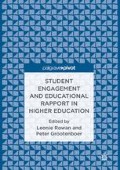Abstract
A problematic shift in culture has seen the focus of Western universities move from the collective pursuit of wisdom to a pre-packaging of professional knowledge and an emphasis on profits, accountability and student throughput (Connell, The good university. Paper presented at the meeting of the NTEU, Griffith University, Brisbane, Australia, 2015). This commodification of education can manifest in classrooms as reductive pedagogies of uniformity, conformity and knowledge transmission which impact on student satisfaction, attendance and teacher/student rapport. This chapter documents my attempts at resisting these pedagogies in an undergraduate Secondary English curriculum course. I set about building rapport with students by fostering democratic spaces where all were permitted a voice in designing the learning agenda. Students were encouraged to lead discussions, suggest tutorial content/foci and emotionally “check in” with their tutor. Student feedback and increased attendance rates indicate that there is value to be had in listening authentically before the talking begins.
Access this chapter
Tax calculation will be finalised at checkout
Purchases are for personal use only
Notes
- 1.
Teaching/learning is not intended as a binary whereby the teacher teaches and the student learns. As can be evidenced from this chapter—and indeed the book—committed educators are forever learning.
References
Astin, A.W. (1984). Student involvement: A developmental theory for higher education. Journal of College Student Personnel, 25(4), 297–308.
Butler, J. (1990). Gender trouble. London: Routledge.
Butler, J. (2004). Undoing gender. New York: Routledge.
Cadman, K. (2005). Towards a “pedagogy of connection” in critical research education: A REAL story. Journal of English for Academic Purposes, 4(4), 353–367.
Carr, W. (2006). Education without theory. British Journal of Educational Studies, 54(2), 136–159. doi:10.1111/j.1467-8527.2006.00344.x.
Carr, W., & Kemmis, S. (1986). Becoming critical: Knowing through action research. Geelong: Deakin University Press.
Chen, J., & Lin, T.-F. (2008). Class attendance and exam performance: A randomized experiment. The Journal of Economic Education, 39(3), 213–227. doi:10.3200/JECE.39.3.213-227.
Davies, B. (2005). The subject of post-structuralism: A reply to Alison Jones. In C. Skelton & B. Francis (Eds.), A feminist critique of education: 15 years of gender education (pp. 96–109). London: Routledge.
Devadoss, S., & Foltz, J. (1996). Evaluation of factors influencing student class attendance and performance. American Journal of Agricultural Economics, 78(3), 499–507.
Durden, G.C., & Ellis, L.V. (1995). The effects of attendance on student learning in principles of economics. The American Economic Review, 85(2), 343–346.
Freire, P. (1971). Pedagogy of the oppressed (trans: Ramos M.B.,). New York: Herder & Herder.
Freire, P. (1985). The politics of education. Basingstoke: Macmillan.
Freire, P. (2000). Pedagogy of the oppressed. In A. Freire & D. Macedo (Eds.), The Paulo Freire reader (pp. 45–79). New York: Continuum International.
Frisby, B.N., & Martin, M.M. (2010). Instructor–student and student–student rapport in the classroom. Communication Education, 59(2), 146–164. doi:10.1080/03634520903564362.
Giroux, H. (2003). Critical theory and educational practice. In A. Darder, M. Baltodano, & R. Torres (Eds.), The critical pedagogy reader (pp. 27–56). New York: Routledge.
Giroux, H.A. (1992). Border crossings: Cultural workers and the politics of education. New York: Psychology Press.
Giroux, H.A. (2001). Theory and resistance in education: Towards a pedagogy for the opposition. Westport: Greenwood Publishing Group.
hooks, bell. (1994). Teaching to transgress: Education as the practice of freedom. London: Routledge.
Johnson, T., & Reed, R. (2012). Philosophical documents in education (4th ed). New Jersey: Pearson Education.
Klem, A.M., & Connell, J.P. (2004). Relationships matter: Linking teacher support to student engagement and achievement. Journal of School Health, 74(7), 262–273.
Lather, P. (1988). Feminist perspectives on empowering research methodologies. Women’s Studies International Forum, 11(6), 569–581.
Lather, P. (1991). Feminist research in education: Within/Against. Geelong: Deakin University.
Lingard, B., & Mills, M. (2003). Teachers and school reform: Working with productive pedagogies and productive assessment. Critical Studies in Education, 44(2), 1–18.
Lingard, B., Mills, M., & Hayes, D. (2000). Teachers, school reform and social justice: Challenging research and practice. The Australian Educational Researcher, 27(3), 101–115.
Massingham, P., & Herrington, T. (2006). Does attendance matter? An examination of student attitudes, participation, performance and attendance. Journal of University Teaching & Learning Practice, 3(2), 82–103.
McLaren, P. (2015). Life in schools: An introduction to critical pedagogy in the foundations of education (6th ed). Boulder: Paradigm.
Schwab, J.J. (1969). The practical: A language for curriculum. The School Review, 78(1), 1–23.
Author information
Authors and Affiliations
Corresponding author
Editor information
Editors and Affiliations
Rights and permissions
Copyright information
© 2017 The Author(s)
About this chapter
Cite this chapter
Lennon, S. (2017). What I really want from this course is…: Tailoring Learning to Meet Students’ Needs, using Pedagogies of Connection and Engagement. In: Rowan, L., Grootenboer, P. (eds) Student Engagement and Educational Rapport in Higher Education. Palgrave Macmillan, Cham. https://doi.org/10.1007/978-3-319-46034-5_5
Download citation
DOI: https://doi.org/10.1007/978-3-319-46034-5_5
Published:
Publisher Name: Palgrave Macmillan, Cham
Print ISBN: 978-3-319-46033-8
Online ISBN: 978-3-319-46034-5
eBook Packages: EducationEducation (R0)

